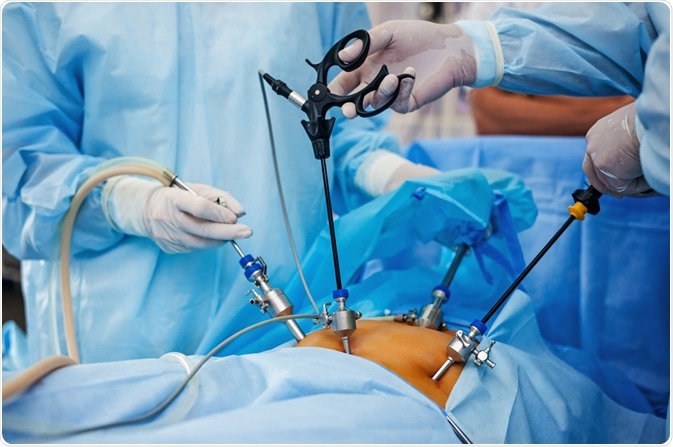Bands of scar tissue that join two parts of tissue together that would otherwise not be physiologically joined together constitute adhesions. These abnormal connections have a plastic wrap appearance. They appear like thin sheets or thicker fibrous bands.
 Image Credit: flywish / Shutterstock.com
Image Credit: flywish / Shutterstock.com
Adhesions develop when the repair mechanisms of the body are triggered by events such as trauma, infection, radiation, or surgery. They may occur anywhere in the body. However, they are most commonly found in the heart, pelvis, and gastrointestinal tract.
Typically, cells responsible for repairing organ damage do not distinguish between one organ and another or between different parts of the same organ. Hence, any contact between the part of the organ damaged with another organ or another part of itself may result in the formation of scar tissue at the interface. This is an inevitable part of the healing processes within the body.
Adhesions are intrinsically painless; the pain that occurs in association with adhesions is a secondary complication due to the problems that the adhesions may create. For example, pain may result from an adhesion tugging on a nerve or causing obstruction within the intestines, which can lead to pain in the pelvis and the restriction of the movement of food, fluid, and stool through the bowels.
In addition to pain and obstruction, adhesions may also cause complications such as female infertility.
Complications of abdominal adhesions
Abdominal surgery is one of the most frequent causes of adhesions. Almost everyone who undergoes an abdominal surgery may develop adhesions. These connective bands of scar tissue tend to become larger and tighter as time passes and consequently may cause problems several years after a surgery was performed.
Tissue incisions, contact of internal tissues with non-biological agents like gauze, and the dehydration of internal organs during surgery are just some of the reasons why adhesions may develop after an abdominal surgery.
Intestinal obstruction leads to the build up of food, fluid, and gas in the intestines, which can cause rupture of the intestines once the pressure has built up enough to do so. The leakage of harmful intestinal contents into the abdominal cavity, if left untreated, can be fatal.
Female infertility occurs when abdominal adhesions inside or in the vicinity of the fallopian tubes block eggs from reaching the uterus. These women are at an increased risk for an ectopic pregnancy, which is a pregnancy where the fetus attempts to grow outside of the womb. This is a potentially life-threatening condition for the pregnant woman if hemorrhage arises.
Abdominal adhesions may also occur in up to 10% of people who never may have had any surgical operations done. The formation of adhesions after surgery typically begins within a few days after the procedure, but their symptoms may not occur for several months or, as alluded to earlier, many years later. Adhesions, ironically, are treated surgically where applicable, but they commonly recur, because surgery causes them in the first place.
The Story of Abdominal Adhesions
Further Reading
Last Updated: Feb 21, 2023